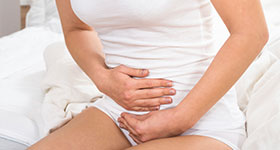
Featured Articles

Help for Women with Urinary Incontinence
Loss of bladder control is common among women. Learn about the options for preventing and treating this annoying problem.

Breaking the Silence About Pelvic Prolapse
Pelvic prolapse is common but rarely discussed. Don’t be embarrassed – learn more about causes and treatments for this condition.

Facts About Vaginal Infections
There are many causes of vaginal infections. A proper diagnosis is the key to effective treatment.
Ask an Expert
Ask the Expert Team
Sutter Health
I'm female (36) with a Mirena IUD. I have lower abdominal pains that feel like my uterus is being squeezed. It's worse after my period or intense orgasms. My IUD was checked and it's in the correct place.
Although the Mirena IUD is an excellent method for contraception, control of menstrual bleeding, and cramping with periods, in some women it is not well tolerated. Since you have quite clearly identified your p... continue reading about I'm female (36) with a Mirena IUD. I have lower abdominal pains that feel like my uterus is being squeezed. It's worse after my period or intense orgasms. My IUD was checked and it's in the correct place.
Ask the Expert Team
Sutter Health
I'm 38 and have been in a relationship for three years. I've been on the pill for 20 years and don't want more kids, but I don't like the melasma side effect of birth control pills. I've considered an IUD but know someone whose device migrated. Options?
If your major goal, in addition to reliable contraception, is to reduce the menstrual flow and frequency of periods, then a Mirena IUD, which secretes progesterone-like hormone locally in the uterine cavity wit... continue reading about I'm 38 and have been in a relationship for three years. I've been on the pill for 20 years and don't want more kids, but I don't like the melasma side effect of birth control pills. I've considered an IUD but know someone whose device migrated. Options?
Heidi Wittenberg, M.D., M.S., FPMRS
California Pacific Medical Center
I had a partial hysterectomy 18 years ago (my ovaries were not removed). Lately I've been having pain and cramping, so recently had x-rays and an ultrasound. The doctor could not find my ovaries. Can ovaries just disappear on their own?
If ovaries are not removed surgically, they are still present. After menopause, our ovaries do shrink. Pre-menopause ovaries are 3-4cm, but after menopause they can be 0.5cm-1.0cm. The older we get, the smaller... continue reading about I had a partial hysterectomy 18 years ago (my ovaries were not removed). Lately I've been having pain and cramping, so recently had x-rays and an ultrasound. The doctor could not find my ovaries. Can ovaries just disappear on their own?
Rodman S. Rogers, M.D.
SPMF San Francisco HMO Network
Regarding stress incontinence and using the pig skin mesh sling option - is it possible for a patient to reject the sling?
While nearly anything is conceivable or possible in individual situations, it's my understanding that the pig dermis is treated to remove all cellular components, leaving just the natural, treated sterile colla... continue reading about Regarding stress incontinence and using the pig skin mesh sling option - is it possible for a patient to reject the sling?
Risa Kagan, M.D., FACOG
Alta Bates Summit Medical Center - Alta Bates Campus
Is it normal for a 60-year-old woman to have bleeding after sex?
It is not normal to have bleeding after sex at any age, but particularly for post menopausal women. Bleeding after sex can be an indication of damage to vaginal tissues, which are more fragile after menopause, ... continue reading about Is it normal for a 60-year-old woman to have bleeding after sex?
Jill D. Foley, M.D., FACOG
Sutter East Bay Medical Foundation
How likely is it for a woman to get pregnant after having her tubes tied?
Good question. The terms tubal ligation, tubes tied, tubal sterilization, and female sterilization can all be used interchangeably to describe the same process. In the U.S., up to one third of women use sterili... continue reading about How likely is it for a woman to get pregnant after having her tubes tied?
Wesley S. Hilger, M.D., FACOG
Surgery Center Division
I have prolapse that is made worse when I run. Running is something I need to be able to do, so what would you recommend? I've heard about pessaries - what are they?
Prolapse of the pelvic organs should not be something that slows you down. In many cases relief can be obtained with a simple, noninvasive treatment called a pessary. A pessary is a silicon or rubber device tha... continue reading about I have prolapse that is made worse when I run. Running is something I need to be able to do, so what would you recommend? I've heard about pessaries - what are they?
Risa Kagan, M.D., FACOG
Alta Bates Summit Medical Center - Alta Bates Campus
I was told that my endometriosis will go away once I pass menopause. What if I decide to take hormone therapy during menopause - will that continue to aggravate the endometrial lesions?
For women who have a history of endometriosis, and they choose to go on hormone therapy, it will not stimulate endometriosis if they take continuous estrogen and progesterone. The progesterone reduces any stimu... continue reading about I was told that my endometriosis will go away once I pass menopause. What if I decide to take hormone therapy during menopause - will that continue to aggravate the endometrial lesions?
Susan Maayah, M.D.
Palo Alto Medical Foundation
I had a hysterectomy in June. I still have my tubes and ovaries and a small bit of cervix. Why and how am I still having full periods every month? Where is this blood coming from?
The type of surgery you had is a supracervical hysterectomy. If your ovaries are still functioning, then you are still having monthly ovulatory cycles. The monthly cycle causes bleeding from the endometrial tis... continue reading about I had a hysterectomy in June. I still have my tubes and ovaries and a small bit of cervix. Why and how am I still having full periods every month? Where is this blood coming from?
More Resources
Healthwise Resource Library
Look up helpful health information.
Patient Information
Practical info for Sutter patients.
Tools and Quizzes
Online tools to help you make decisions about your health.









